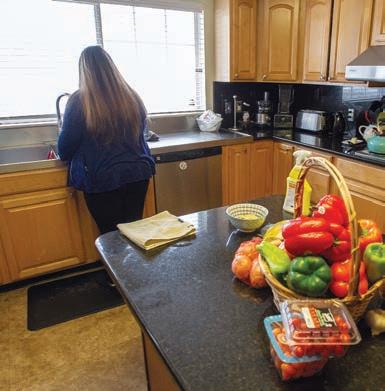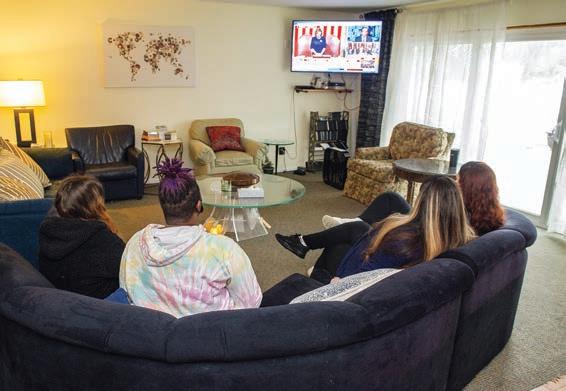
7 minute read
Battling Human Trafficking
JEWSIN THED ON THE COVER
Sanctum House founder Edee Franklin of Huntington Woods and member Claire discuss issues.
Advertisement


Battling
Human Trafficking



Sanctum House seeks funding to sustain and expand its haven for victims.
MAYA GOLDMAN CONTRIBUTING WRITER
PHOTOS BY JERRY ZOLYNSKY
While Claire was living in a university town, a group of men had been watching her for a while without her knowledge.
One day, they sent someone to her door. He was crying and wearing a sling. She didn’t know what to do but she wanted to help, so she invited the man in for a glass of water.
“And that’s sort of how things changed,” Claire told the Detroit Jewish News. (Only her first name will be used in this article to protect her privacy.)
The man was a human trafficker. Human trafficking is the practice of coercing a person into labor or to engage in commercial sexual actions. It is sometimes referred to as modern-day slavery.
Claire would go on to be starved, brainwashed and abused.
“A few days later — I don’t even know how long, because they call it “trauma brain,” like, you lose sense of time — I was able to escape,” Claire said.
She got him to take her to a public place where she knew people. From there, she went to a hospital. That’s how she found out about Sanctum House, a group home in Oakland County providing 24/7 support for women who’ve been trafficked.
“After this happened, if I hadn’t come to Sanctum House, yes, doctors would have prescribed me Ativan and Xanax and whatever else for the rest of my life. But, trauma takes more than that,” she said.
During Claire’s first two months at Sanctum House, she was in shock. The trauma she felt was so intense that if it had been on the outside of her body, she’d have been in a “full body cast for like a year,” she said. The traffickers had broken her down completely, to the point where she had no trust left and no tools to relate to the outside world, she told the JN.
Today, Claire is still living at Sanctum House as she pursues a master’s degree. The residential program has given her the tools to move forward with her life after trauma. Sanctum House, she said, is a “national game-changer.”
“When you come to Sanctum House, here is the space where you can start to unpack that,” Claire said. “And it’s more than just sort of giving a man of fish. If you give a man a fish, he eats only for a day — but Sanctum House teaches you how to go back to living.”
A UNIQUE APPROACH
When Huntington Woods resident Edee Franklin was doing a self-improvement program in 2013, she began to think about creating a group home for survivors of human trafficking.
A recovering heroin addict herself, Franklin realized how important longer-term, trauma- and addiction-informed care could be to trafficking survivors.
She didn’t waste any time. Franklin, a real estate agent, assembled a planning committee and did five years of research and development. They put together a comprehensive plan to help survivors heal and, in 2015, gained a
A woman does dishes in the kitchen.

501(c)3 designation for the new nonprofit.
Sanctum House finally opened its doors to human trafficking survivors in February 2018. The organization keeps its exact location private to protect its residents.
“Now we’ll be open almost three years, and we’re ready for expansion,” Franklin said. “We’ve really grown. We’ve really created, I think, a wonderful program.”
Sanctum House was the first of its kind in Southeast Michigan and one of only a few similar programs in the United States. The program serves women ages 18 and up, who generally stay in the house for about two years — though some women feel ready to leave before the two-year mark, and some stay a bit longer, Franklin said. Referrals are accepted from all across the country.
The program includes comprehensive healthcare including
mental healthcare and trauma therapy, vocational skills training and job placement, financial education, peer support and much more.
It’s “very much designed in a woman’s needs and what they want,” Franklin said. “We have people now who want to go to culinary school, who are working outside of the house, who purchase their own vehicles.”
Sanctum House has partnerships with hospitals, social workers and over 30 different organizations that supplement its services.
Since its beginnings in 2018, Sanctum House has helped more than 55 women through its residential program with 24-hour care. All residents are drug-free and are working through appropriate 12-step programs; many have found jobs outside the house. Nineteen have reunited with family members, and six are attending college — including one who made the dean’s list.
For Franklin, who grew up attending Adat Shalom Synagogue, the spirit of the house is connected to her own Jewish faith. She said she created Sanctum House in the spirit of tikkun olam, repairing the world.
It’s “from the spirit of Judaism that we take care of one another,” she said. “And the goal is to heal the world. I mean, that’s what we do.”
COVID CHALLENGES
Of course, the COVID-19 pandemic has impacted Sanctum House over the past year.
Luckily, the house has stayed COVID-19-free, but the tumult has limited the growth of women at the house in some ways, Claire said — it’s much harder to get out and start to build a new life during a pandemic.
Even more than that, COVID-19 has affected Sanctum House’s ability to spread awareness of human trafficking. More than 20 speaking engagements for people affiliated with Sanctum House were canceled this year, Franklin said.
Sanctum House has also provided training to hundreds of first responders and hospital employees on how to spot human trafficking and react appropriately when they see the signs — that’s not possible in the same way this year.
“You can’t get the word out,” Claire said. “And that’s really fundamental to fighting human trafficking and saving people from human traffickers.”
The pandemic has pushed trafficking itself further underground. Lockdowns and quarantines have made it so women in trafficking situations are brought into public less often, and more internet sales and pornography have taken place, Franklin said.
“Women are being trafficked
Program Manager Shannon Brandt of Farmington Hills and Executive Director Karen Moore of Dearborn play cards with Katrise and Jesa.
House members watch TV.
and abused and sexually assaulted, so we can’t forget,” Franklin said. “Everything is still going on while COVID is going on.”
CONTRIBUTORS SOUGHT
The virus has also cut down on Sanctum House’s ability to raise money, as its usual engagements and fundraisers have been canceled. Franklin is still writing grants and depends on sponsorships, but now she’s launched a three-phase, $3 million capital campaign.
The organization is currently trying to raise $1.4 million to purchase its property and the adjacent lot. This will allow it to nearly triple the number of women it can serve at a time, from 12 up to 34, Franklin told the JN.
Franklin is also hoping to find around $600,000 to make necessary improvements to its campus and ensure funds for operating expenses and salaries for the trained professionals
who run the therapeutic programs. She’s then aiming to raise an additional $1 million for ongoing operations.
Sanctum House has already received several large pledges for the purchase of the building. Now Franklin is hoping to find “a few angels” who can help


Sanctum House make its goals for sustaining funds.
“We’re in this capital campaign for sustainability,” Franklin said. “If you don’t have a program, you’ve got nothing to give the women that they can hang their hats on.”
Despite the challenges of the year, Franklin and the rest of the staff and stakeholders at Sanctum House remain committed to helping survivors and raising awareness of human trafficking.
“It may be a heinous crime, and you don’t really want to look at it,” she said. “But there are women that are being tortured and abused. Once you’re aware — once you know better — you do better.”
Above all, “we’re all entitled to our civil rights and sanctum,” Franklin said.
January is National Slavery and Human Trafficking Prevention Month. To learn more about Sanctum House and its capital campaign, visit www.sanctumhouse.org/about-sanctum-house/.










